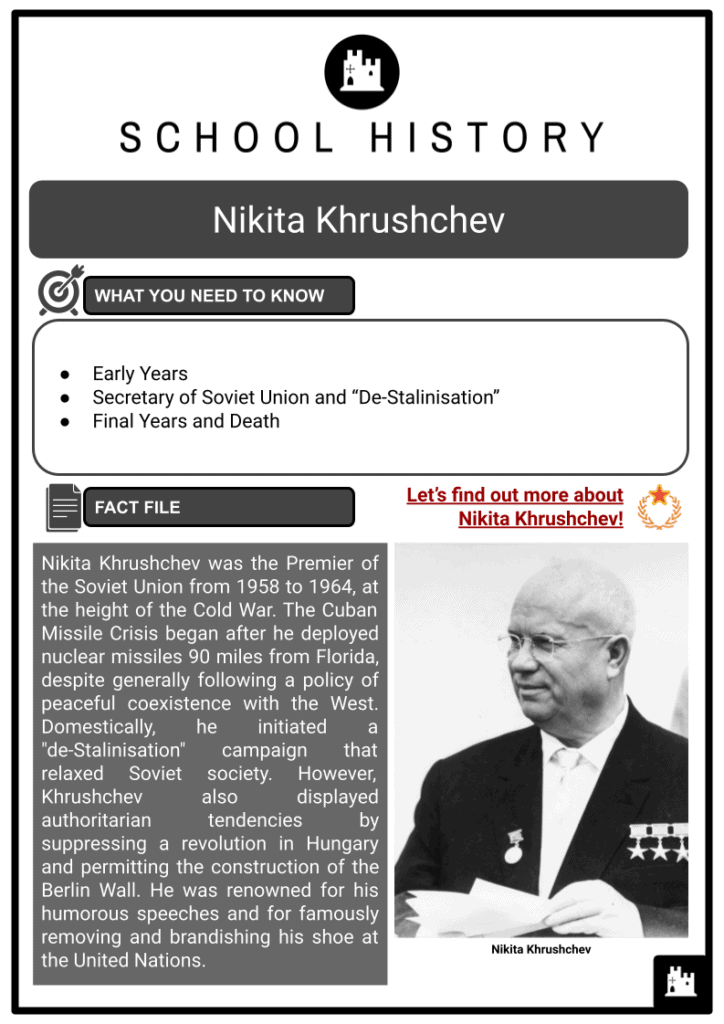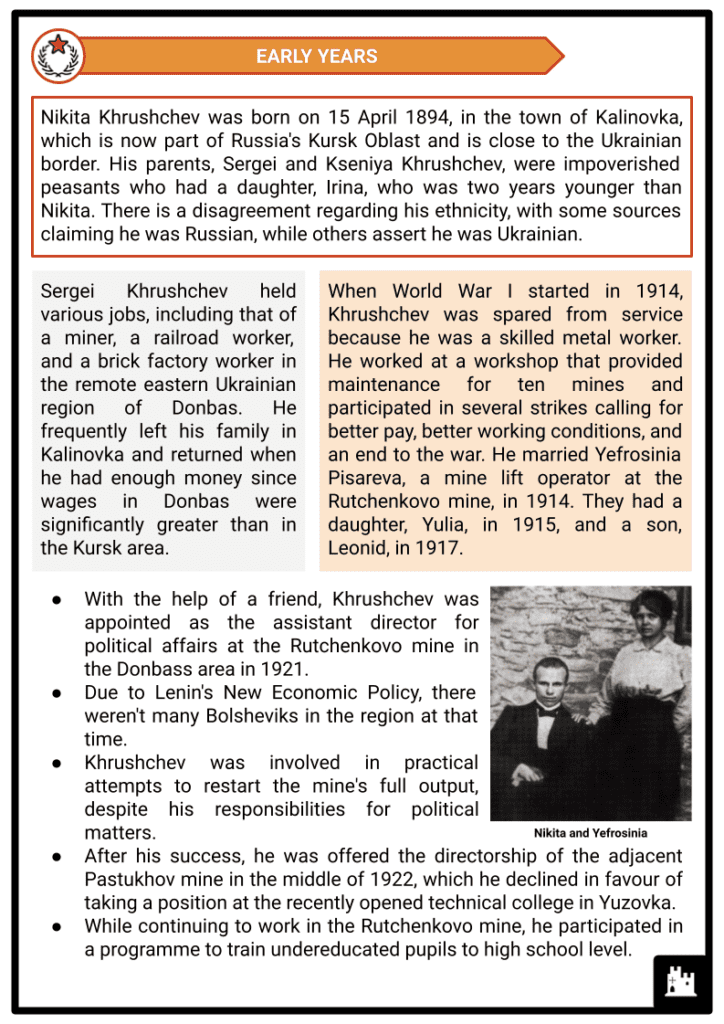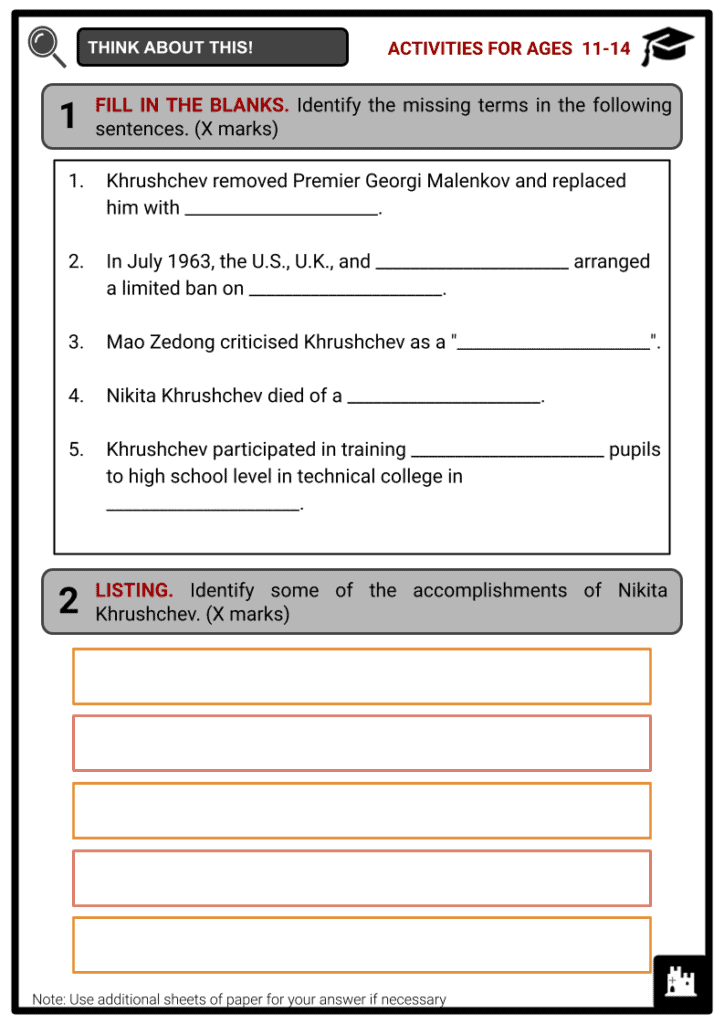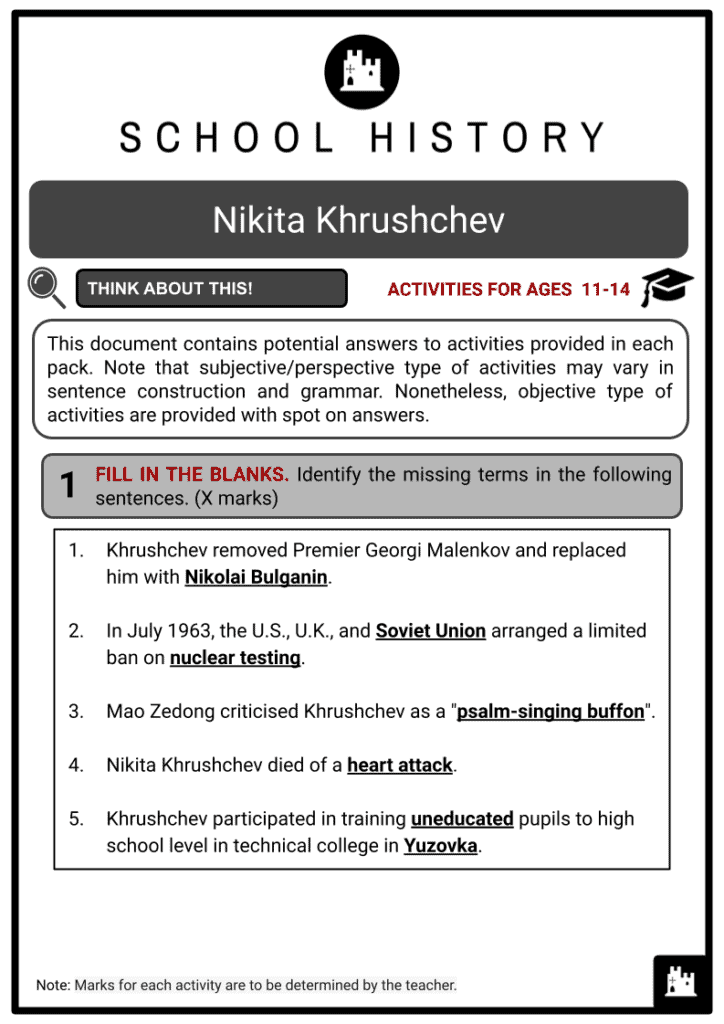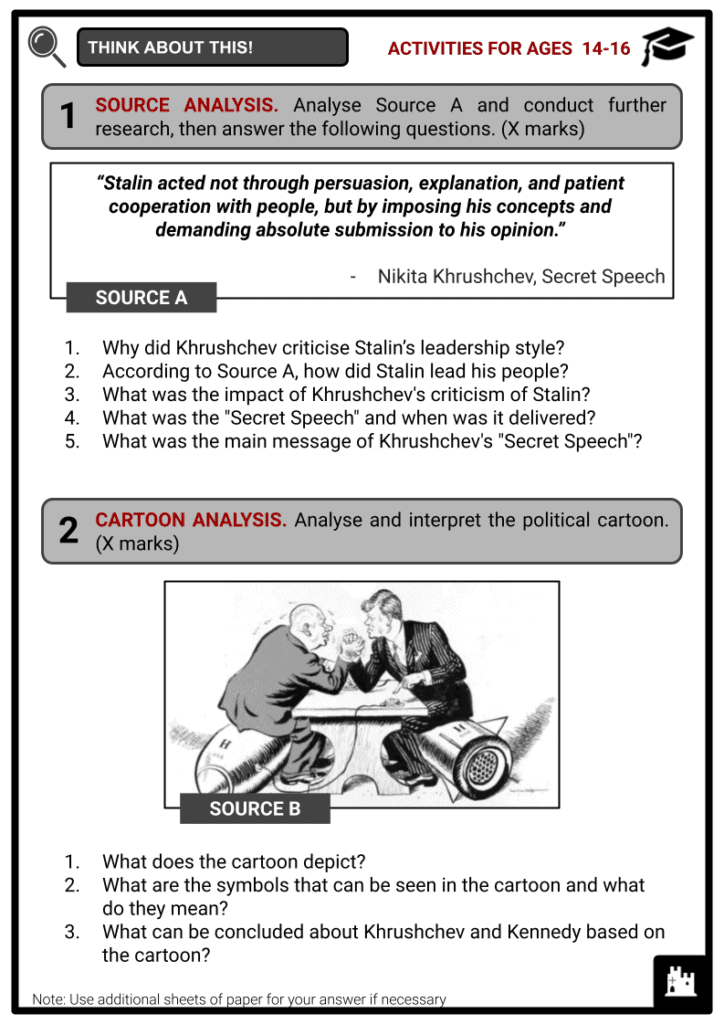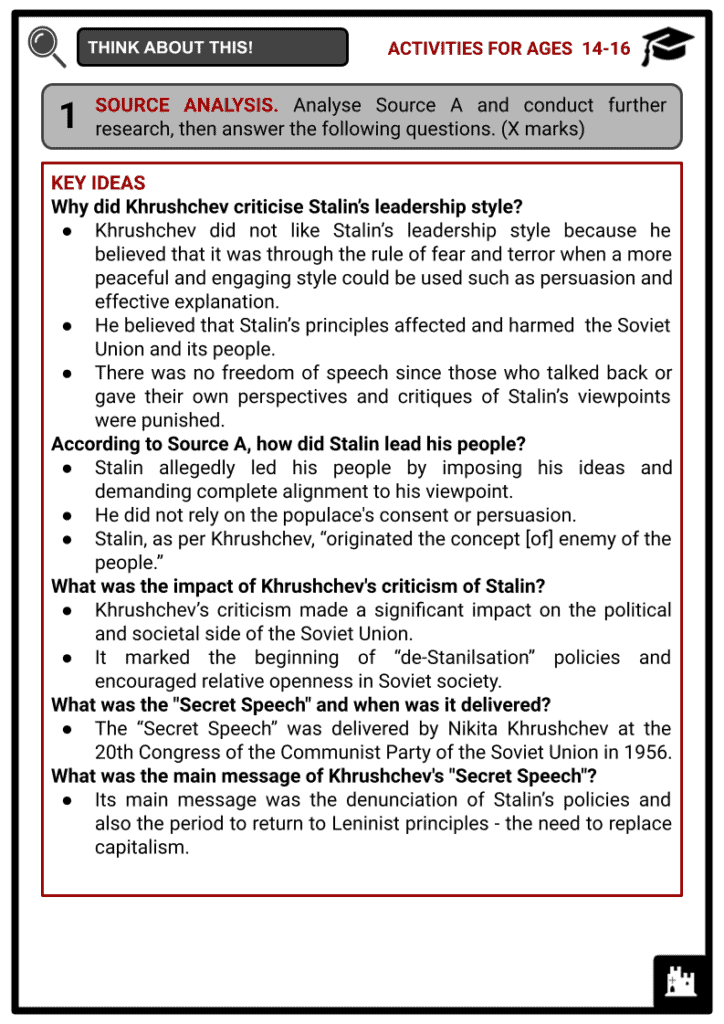Nikita Khrushchev Worksheets
Do you want to save dozens of hours in time? Get your evenings and weekends back? Be able to teach about Nikita Khrushchev to your students?
Our worksheet bundle includes a fact file and printable worksheets and student activities. Perfect for both the classroom and homeschooling!
Summary
- Early Years
- Secretary of Soviet Union and “De-Stalinisation”
- Final Years and Death
Key Facts And Information
Let’s find out more about Nikita Khrushchev!
Nikita Khrushchev was the Premier of the Soviet Union from 1958 to 1964, at the height of the Cold War. The Cuban Missile Crisis began after he deployed nuclear missiles 90 miles from Florida, despite generally following a policy of peaceful coexistence with the West. Domestically, he initiated a "de-Stalinisation" campaign that relaxed Soviet society. However, Khrushchev also displayed authoritarian tendencies by suppressing a revolution in Hungary and permitting the construction of the Berlin Wall. He was renowned for his humorous speeches and for famously removing and brandishing his shoe at the United Nations.
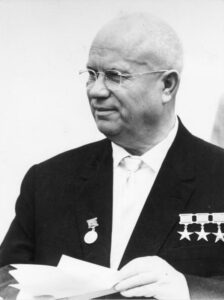
EARLY YEARS
- Nikita Khrushchev was born on 15 April 1894, in the town of Kalinovka, which is now part of Russia's Kursk Oblast and is close to the Ukrainian border. His parents, Sergei and Kseniya Khrushchev, were impoverished peasants who had a daughter, Irina, who was two years younger than Nikita. There is a disagreement regarding his ethnicity, with some sources claiming he was Russian, while others assert he was Ukrainian.
- Sergei Khrushchev held various jobs, including that of a miner, a railroad worker, and a brick factory worker in the remote eastern Ukrainian region of Donbas. He frequently left his family in Kalinovka and returned when he had enough money since wages in Donbas were significantly greater than in the Kursk area.
- When World War I started in 1914, Khrushchev was spared from service because he was a skilled metal worker. He worked at a workshop that provided maintenance for ten mines and participated in several strikes calling for better pay, better working conditions, and an end to the war. He married Yefrosinia Pisareva, a mine lift operator at the Rutchenkovo mine, in 1914. They had a daughter, Yulia, in 1915, and a son, Leonid, in 1917.
- With the help of a friend, Khrushchev was appointed as the assistant director for political affairs at the Rutchenkovo mine in the Donbass area in 1921.
- Due to Lenin's New Economic Policy, there weren't many Bolsheviks in the region at that time.
- Khrushchev was involved in practical attempts to restart the mine's full output, despite his responsibilities for political matters.
- After his success, he was offered the directorship of the adjacent Pastukhov mine in the middle of 1922, which he declined in favour of taking a position at the recently opened technical college in Yuzovka.
- While continuing to work in the Rutchenkovo mine, he participated in a programme to train undereducated pupils to high school level.
- He temporarily sided with Leon Trotsky's followers in their dispute with Joseph Stalin's supporters over party democracy. Due to all of these activities, he had little time for schooling, and although he subsequently claimed to have completed his rabfak studies, it is unclear whether this was actually the case.
- In the middle of 1925, Khrushchev was chosen as the Party secretary for the Petrovo-Marinsky raikom, or neighbourhood, next to Stalino. The raikom was around 1,000 square kilometres in size, and Khrushchev was constantly moving throughout his territory and showing interest in even the smallest issues. At the end of 1925, Khrushchev was chosen as a non-voting delegate to the U.S.S.R Communist Party's 14th Congress in Moscow.
- In 1929, Khrushchev relocated to Moscow, where he steadily advanced up the ranks of the Communist Party. He eventually made it into Joseph Stalin's inner circle, who at that point had secured power over the nation and begun a brutal purge of perceived adversaries. Millions of people perished in famines spurred on by the forced collectivisation of agriculture, and millions more were killed or imprisoned in Gulag labour camps.
SECRETARY OF SOVIET UNION AND “DE-STALINISATION”
- Khrushchev organised soldiers to fight Nazi Germany in Ukraine and in Stalingrad during World War II. He assisted in the post-war reconstruction of the destroyed countryside while suppressing Ukrainian nationalist rebellion. When Stalin passed away in March 1953, Khrushchev had already established himself as a potential successor. He rose to become the leader of the Communist Party and one of the most influential figures in the U.S.S.R six months later.
- Khrushchev and other senior officials initially exercised collaborative leadership to govern. However, in 1955, he orchestrated the removal of Premier Georgi Malenkov and his replacement with Nikolai Bulganin, an ally. Khrushchev thwarted Malenkov's coup attempt in June 1957 and became prime minister the following March.
- Once a staunch supporter of Stalin, Khrushchev delivered a lengthy speech in February 1956 denouncing the dictator for, among other things, detaining and deporting opponents, placing himself above the party, and providing ineffective wartime leadership.
- This scathing, albeit unfinished, condemnation of Stalin was intended to be kept confidential. However, by June of that year, the U.S. State Department made the whole document available.
- Starting in 1957, Khrushchev made some token efforts to rehabilitate Stalin's reputation. Nonetheless, in 1961, when Stalingrad was renamed, and his remains were taken out of Lenin's tomb in Moscow's Red Square, Khrushchev changed his mind once more.
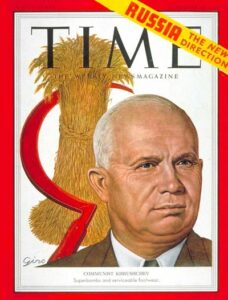
Nikita in TIME Magazine - Protesters in the Soviet satellite countries of Poland and Hungary took to the streets after Khrushchev's alleged "secret speech." While the Polish uprising was mostly quelled peacefully, the Hungarian uprising was brutally suppressed by troops and tanks. In total, at least 2,500 Hungarians were killed, and 13,000 were injured in late 1956. More people fled to the West, while others were detained or deported.
- On the domestic front, Khrushchev attempted to increase agricultural production and raise living standards with varying degrees of success. He also relaxed censorship rules to encourage creativity, allowed more foreign visitors into the country, and decreased the authority of the feared Soviet secret police. In 1957, he launched the Sputnik satellite, which ushered in the space age. Two years later, a Soviet rocket struck the moon, and Yuri A. Gagarin became the first man to journey to space in 1961.
- Khrushchev had a contentious relationship with the West. Although he was a strong supporter of communism, he favoured peaceful coexistence with capitalist nations. Unlike Stalin, he even visited the United States. In 1960, the Soviet Union shot down an American U-2 spy plane deep within their territory, leading to a slight deterioration in relations between the two superpowers. The following year, Khrushchev gave the green light for the construction of the Berlin Wall in an attempt to prevent East Germans from migrating to the capitalist West.
- When the United States learned that the Soviet Union had nuclear weapons stationed in Cuba in October 1962, Cold War tensions reached a climax.
- Despite the imminent threat of a nuclear war, after a 13-day stalemate, Khrushchev agreed to disarm.
- In response, U.S. President John F. Kennedy publicly agreed not to invade Cuba after having authorised the failed Bay of Pigs invasion the previous year.
- Kennedy secretly agreed to remove American nuclear weapons from Turkey. The U.S., U.K., and Soviet Union arranged a limited ban on nuclear testing in July 1963.
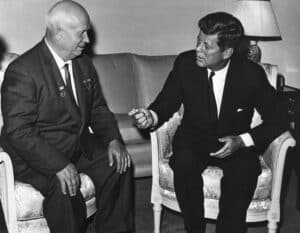
Khrushchev and Kennedy - Mao Zedong, the leader of China and a fellow communist, was one of Khrushchev's greatest foes. From 1960, the two sides began an increasingly bitter war of words, with Khrushchev denouncing Mao as a "left revisionist" who knew nothing of modern warfare. The Chinese criticised Khrushchev as a "psalm-singing buffoon" who misunderstood the nature of Western imperialism.
FINAL YEARS AND DEATH
- Khrushchev's downfall was brought about by various factors, but it was also in line with the regulations he had established for the Central Committee. His impulsive decision-making and lack of collaboration annoyed the members, and his unwieldy administration made the Party appear less significant. They were also enraged by his arrogant disregard for the standards he had set for himself.
- Although his specialty was agriculture, his failure to improve it resulted in an adverse public perception of food shortages. The military was not involved, and there were few foreign policy concerns, but the KGB was a significant source of criticism. In the end, Khrushchev paid less attention to his political base, while his opponents carefully forged their alliance within the Central Committee.
- After being dismissed, Khrushchev retired in luxury on a reduced pension of 400 rubles per month.
- He became a non-person, to the extent that his name was removed from the Great Soviet Encyclopedia, and he was reduced to a state of profound melancholy.
- He began writing his memoirs in 1966, attempting to dictate them outdoors to evade KGB surveillance but ultimately recording them indoors.
- The KGB demanded that he surrender his cassettes in 1968, but he refused, and his son Sergei was subsequently warned of a foreign effort to obtain the memoirs.
- The papers that Sergei delivered to the KGB were ultimately made public in the West under the title Khrushchev Remembers.
- In his final days, Khrushchev visited his son-in-law and former aide and assured them that he would still be remembered.
- Khrushchev died of a heart attack at the Kremlin hospital in Moscow at the age of 77 on 11 September 1971. Instead of receiving a formal funeral and burial in the Kremlin Wall, he was interred at Moscow's Novodevichy Cemetery. Khrushchev's passing was not made public until the hour of his wake, and military personnel were deployed around the cemetery out of concern for demonstrations. Nevertheless, a few intellectuals and artists joined the family at the burial.
Image Sources
- https://en.wikipedia.org/wiki/Nikita_Khrushchev#/media/File:Bundesarchiv_Bild_183-B0628-0015-035,_Nikita_S._Chruschtschow.jpg
- https://en.wikipedia.org/wiki/Nikita_Khrushchev#/media/File:Nikita_Khrushchev-TIME-1953.jpg
- https://en.wikipedia.org/wiki/Nikita_Khrushchev#/media/File:John_Kennedy,_Nikita_Khrushchev_1961.jpg

